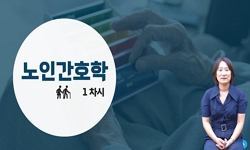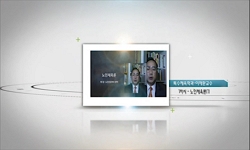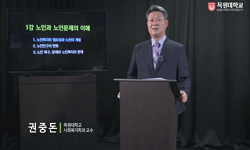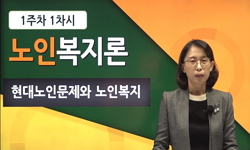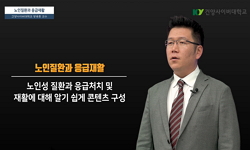21세기에는 의학 기술의 발전, 생활수준의 향상, 건강에 대한 관심 증가, 평균 수명의 연장 등으로 노인들은 노화에 따른 질병 치료와 증상 완화를 위해 약물에 의존하게 된다. 노인은 노화...
http://chineseinput.net/에서 pinyin(병음)방식으로 중국어를 변환할 수 있습니다.
변환된 중국어를 복사하여 사용하시면 됩니다.
- 中文 을 입력하시려면 zhongwen을 입력하시고 space를누르시면됩니다.
- 北京 을 입력하시려면 beijing을 입력하시고 space를 누르시면 됩니다.
https://www.riss.kr/link?id=T11527311
- 저자
-
발행사항
대전: 한남대학교 일반대학원, 2009
-
학위논문사항
학위논문(석사) -- 한남대학교 일반대학원 , 사회복지학과 , 2009. 2
-
발행연도
2009
-
작성언어
한국어
- 주제어
-
DDC
360 판사항(19)
-
발행국(도시)
대전
-
형태사항
ⅴ, 73p.: 삽도; 26 cm.
-
일반주기명
지도교수: 임춘식
참고문헌: p. 60-63 - 소장기관
-
0
상세조회 -
0
다운로드
부가정보
국문 초록 (Abstract)
노인은 노화에 따른 다양한 만성질환으로 인해 평생 동안 약물을 복용하게 되는데, 약물에 대한 부정확한 정보와 지식은 잘못된 복용을 유도해 노인에게 악영향을 가져올 수 있으며, 질병과 약물의 중요성에 대해 노인의 인식 결여 및 인내심이 부족하다.
따라서 본 연구에서는 노인의 올바른 약물 복용을 위해 약물복용 여부, 약물에 대한지식, 약물구매 정보습득 경로가 약물 오·남용행위에 미치는 영향을 알아보고, 노인이 정확한 약물지식을 통해 올바른 약물 복용과 편안한 노후 건강증진을 돕고자 하는 데에 연구의 목적이 있다.
본 연구의 대상자는 대전광역시 종합복지관과 경로당을 이용하는 노인 405명을 대상으로 구조화된 설문지를 사용, 1:1 면접을 실시하였다. 수집된 자료는 SPSS 프로그램을 사용하여 통계처리 하였으며, 빈도분석, χ2와 t-test, One-way ANOVA, Correlation(상관관계분석), Multiple Regression(다중회귀분석)을 사용하였다.
본 연구의 결과를 요약하면 다음과 같다.
첫째, 여성 노인과 배우자가 없는 노인, 혼자 사는 노인, 주관적 건강상태가 좋지 않은 노인, 정부의 생활보조금으로 용돈을 마련하는 노인일수록 약물 복용 여부가 높았다.
둘째, 노인들은 약물에 대한 지식이 높지 않았으며, 남자 노인과 79세 이하인 노인, 학력이 높은 노인, 배우자가 있는 노인, 주관적 건강상태가 좋은 노인, 월 용돈이 많은 노인, 연금이나 퇴직금으로 용돈을 마련하는 노인일수록 약물에 대한 지식이 높았다.
셋째, 남자 노인과 약물 복용 여부가 높을수록, 약물 구매 정보를 의사로부터 얻지 않을수록, 약물에 대한 지식이 낮을수록 약물 오·남용행위가 높음을 알 수 있고, 성별, 약물복용 여부, 약물 구매정보 습득경로, 약물에 대한 지식이 약물 오·남용행위에 영향을 미치는 것으로 나타났다.
결과적으로 본 연구는 약물에 대한 지식과 약물정보가 부족한 노인들에게 정확한 약물정보와 올바른 지식을 제공해 안전하게 약물을 복용할 수 있도록 노인 당사자들은 물론이고 가족구성원들에게도 사전 사후교육이 필요하며, 건강문제를 약물로만 해결하려는 생각을 변화시켜 건강생활 실천을 통하여 건강을 유지할 수 있도록 해야 할 것이며, 나아가 노인들의 올바른 약물복용을 위한 사회복지프로그램을 개발해야 할 과제를 안고 있다.
21세기에는 의학 기술의 발전, 생활수준의 향상, 건강에 대한 관심 증가, 평균 수명의 연장 등으로 노인들은 노화에 따른 질병 치료와 증상 완화를 위해 약물에 의존하게 된다.
노인은 노화에 따른 다양한 만성질환으로 인해 평생 동안 약물을 복용하게 되는데, 약물에 대한 부정확한 정보와 지식은 잘못된 복용을 유도해 노인에게 악영향을 가져올 수 있으며, 질병과 약물의 중요성에 대해 노인의 인식 결여 및 인내심이 부족하다.
따라서 본 연구에서는 노인의 올바른 약물 복용을 위해 약물복용 여부, 약물에 대한지식, 약물구매 정보습득 경로가 약물 오·남용행위에 미치는 영향을 알아보고, 노인이 정확한 약물지식을 통해 올바른 약물 복용과 편안한 노후 건강증진을 돕고자 하는 데에 연구의 목적이 있다.
본 연구의 대상자는 대전광역시 종합복지관과 경로당을 이용하는 노인 405명을 대상으로 구조화된 설문지를 사용, 1:1 면접을 실시하였다. 수집된 자료는 SPSS 프로그램을 사용하여 통계처리 하였으며, 빈도분석, χ2와 t-test, One-way ANOVA, Correlation(상관관계분석), Multiple Regression(다중회귀분석)을 사용하였다.
본 연구의 결과를 요약하면 다음과 같다.
첫째, 여성 노인과 배우자가 없는 노인, 혼자 사는 노인, 주관적 건강상태가 좋지 않은 노인, 정부의 생활보조금으로 용돈을 마련하는 노인일수록 약물 복용 여부가 높았다.
둘째, 노인들은 약물에 대한 지식이 높지 않았으며, 남자 노인과 79세 이하인 노인, 학력이 높은 노인, 배우자가 있는 노인, 주관적 건강상태가 좋은 노인, 월 용돈이 많은 노인, 연금이나 퇴직금으로 용돈을 마련하는 노인일수록 약물에 대한 지식이 높았다.
셋째, 남자 노인과 약물 복용 여부가 높을수록, 약물 구매 정보를 의사로부터 얻지 않을수록, 약물에 대한 지식이 낮을수록 약물 오·남용행위가 높음을 알 수 있고, 성별, 약물복용 여부, 약물 구매정보 습득경로, 약물에 대한 지식이 약물 오·남용행위에 영향을 미치는 것으로 나타났다.
결과적으로 본 연구는 약물에 대한 지식과 약물정보가 부족한 노인들에게 정확한 약물정보와 올바른 지식을 제공해 안전하게 약물을 복용할 수 있도록 노인 당사자들은 물론이고 가족구성원들에게도 사전 사후교육이 필요하며, 건강문제를 약물로만 해결하려는 생각을 변화시켜 건강생활 실천을 통하여 건강을 유지할 수 있도록 해야 할 것이며, 나아가 노인들의 올바른 약물복용을 위한 사회복지프로그램을 개발해야 할 과제를 안고 있다.
다국어 초록 (Multilingual Abstract)
Elderly people should continue to take medicine in their lifetime since they suffer from a variety of chronic diseases because of aging, and the spread of incorrect information and knowledge on drug is likely to have an adverse impact on them by having them take the wrong medicine. Furthermore, elderly people are usually unaware of the importance of diseases and drug.
The purpose of this study was to examine the impacts of the state of drug use among elderly people and their relevant knowledge and information acquisition route on their drug abuse in a bid to assist them to get the right knowledge, take the right medicine, promote their health and live a comfortable life.
The subjects in this study were 405 elderly people who used welfare agencies and senior centers in the city of Daejeon. An one-one-one interview was conducted with structured questionnaires, and the collected data were analyzed with SPSS program. A frequency analysis, x2-test, t-test, one-way ANOVA, correlation analysis and multiple regression procedures were utilized.
The major findings of the study were as follows:
First, medicine taking was more prevalent among the elderly people who were female, who had no spouses, who lived alone, who found themselves not to be in good shape and who depended on government subsidy for allowance.
Second, the elderly people weren't knowledgeable about drug. A better knowledge on drug was owned by those who were male, who were at the age of 79 and down, who were better educated, who had spouses, who considered themselves to be in good health, whose monthly allowance was larger and who relied on pension or retirement grant for allowance.
Third, drug abuse was more common among those who were male, who took more medicine, who didn't get information on drug purchase from doctors and who had a less knowledge on drug. Drug abuse was under the influence of gender, medicine taking, information acquisition route on drug purchase and drug knowledge.
The findings of the study illustrated that not only elderly people but their families should receive education to get the right information to ensure drug-related safety, as the elderly are usually devoid of knowledge and information on drug. They should be encouraged to promote their health in diverse ways instead of merely depending on drug, and social welfare programs should be prepared to stir up the right medicine taking among elderly people.
The elderly increasingly rely on drug to treat their aging-related diseases and alleviate relevant symptoms in the 21st century due to advanced medicine, improved living standard, growing concern for health and extended life span. Elderly people shou...
The elderly increasingly rely on drug to treat their aging-related diseases and alleviate relevant symptoms in the 21st century due to advanced medicine, improved living standard, growing concern for health and extended life span.
Elderly people should continue to take medicine in their lifetime since they suffer from a variety of chronic diseases because of aging, and the spread of incorrect information and knowledge on drug is likely to have an adverse impact on them by having them take the wrong medicine. Furthermore, elderly people are usually unaware of the importance of diseases and drug.
The purpose of this study was to examine the impacts of the state of drug use among elderly people and their relevant knowledge and information acquisition route on their drug abuse in a bid to assist them to get the right knowledge, take the right medicine, promote their health and live a comfortable life.
The subjects in this study were 405 elderly people who used welfare agencies and senior centers in the city of Daejeon. An one-one-one interview was conducted with structured questionnaires, and the collected data were analyzed with SPSS program. A frequency analysis, x2-test, t-test, one-way ANOVA, correlation analysis and multiple regression procedures were utilized.
The major findings of the study were as follows:
First, medicine taking was more prevalent among the elderly people who were female, who had no spouses, who lived alone, who found themselves not to be in good shape and who depended on government subsidy for allowance.
Second, the elderly people weren't knowledgeable about drug. A better knowledge on drug was owned by those who were male, who were at the age of 79 and down, who were better educated, who had spouses, who considered themselves to be in good health, whose monthly allowance was larger and who relied on pension or retirement grant for allowance.
Third, drug abuse was more common among those who were male, who took more medicine, who didn't get information on drug purchase from doctors and who had a less knowledge on drug. Drug abuse was under the influence of gender, medicine taking, information acquisition route on drug purchase and drug knowledge.
The findings of the study illustrated that not only elderly people but their families should receive education to get the right information to ensure drug-related safety, as the elderly are usually devoid of knowledge and information on drug. They should be encouraged to promote their health in diverse ways instead of merely depending on drug, and social welfare programs should be prepared to stir up the right medicine taking among elderly people.
목차 (Table of Contents)
- 제1장 서론 = 1
- 제1절 연구의 필요성 = 1
- 제2절 연구의 목적 = 4
- 제3절 연구의 한계 = 5
- 제2장 이론적 고찰 = 6
- 제1장 서론 = 1
- 제1절 연구의 필요성 = 1
- 제2절 연구의 목적 = 4
- 제3절 연구의 한계 = 5
- 제2장 이론적 고찰 = 6
- 제1절 노인의 특징과 건강 = 6
- 1. 노인의 일반적 특징 = 6
- 2. 건강과 질환의 특징 = 9
- 제2절 노인과 약물 = 11
- 1. 약물의 정의 = 11
- 2. 노인의 약물사용 실태 = 12
- 3. 노인의 약물 오·남용 = 14
- 4. 노인의 약물에 의한 변화 = 17
- 제3절 선행연구의 고찰 = 20
- 제3장 연구방법 = 25
- 제1절 조사대상 및 표집방법 = 25
- 제2절 측정도구 = 25
- 제3절 연구모형 및 연구가설 = 29
- 제4절 자료 분석 방법 = 30
- 제4장 연구결과 및 분석 = 31
- 제1절 조사대상자의 일반적 특성 = 31
- 제2절 노인의 약물복용 = 34
- 1. 약물복용 실태 = 34
- 2. 일반적 특성에 따른 약물복용 여부 = 36
- 3. 약물복용 횟수 및 처방여부 = 38
- 4. 약물구매 방법 = 40
- 5. 일반적 특성에 따른 약물구매 정보습득 경로 = 41
- 제3절 노인의 약물에 대한 지식 = 44
- 1. 약물에 대한 지식 = 44
- 2. 일반적 특성에 따른 약물에 대한 지식 = 45
- 제4절 노인의 약물 오·남용행위 = 47
- 1. 약물 오·남용 행위 = 47
- 2. 일반적 특성에 따른 약물 오·남용행위 = 49
- 제5절 약물복용과 약물 오·남용행위와의 관계 = 51
- 1. 약물복용 여부·빈도·처방여부에 따른 약물 오·남용행위 = 51
- 2. 약물구매 정보습득 경로에 따른 약물 오·남용행위 = 51
- 3. 약물에 대한 지식에 따른 약물 오·남용행위 = 52
- 제6절 약물 오·남용행위에 영향을 미치는 요인 = 53
- 제5장 결론 및 제언 = 55
- 제1절 요약 및 결론 = 55
- 제2절 제언 = 58
- 참고문헌 = 60
- ABSTRACT = 64
- 설문지 = 67





